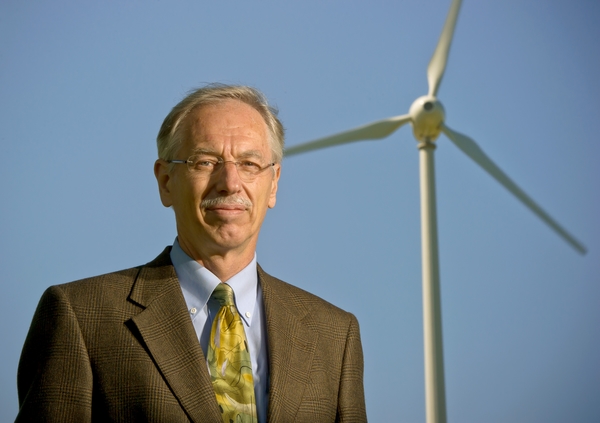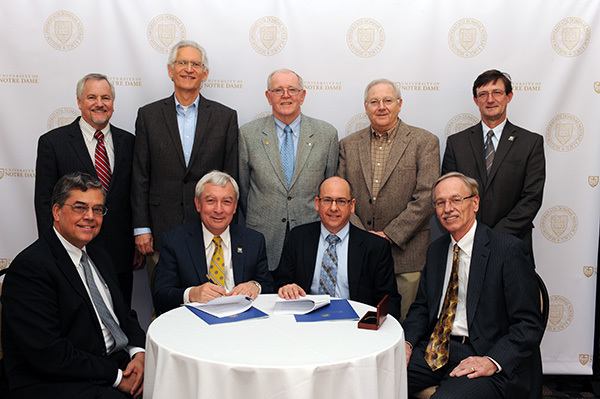
As the world looks for new ways to diversify its energy supply and find renewable resources to power the earth’s growing energy consumption needs, new research from the University of Notre Dame has identified a potential way to make an existing renewable resource – wind energy – more efficient in power production.
Thomas Corke, the Clark Chair Professor in Aerospace and Mechanical Engineering and founding director of the Notre Dame Institute for Flow Physics and Control (FlowPAC), along with a team of collaborative researchers, developed a new plasma actuator that can be used to make a more capable design for wind turbine airflow and control than previous systems. When applied to wind turbines, this actuator could increase the amount of energy that can be produced by up to 10 percent and significantly reduce the wind loads on the rotor blades, improving their longevity.
The University of Notre Dame has recently licensed the plasma actuators, along with a set of improvements in flow control, as part of a patent portfolio. The portfolio includes active devices that reduce turbulent air and improve a turbine’s ability to capture energy from wind.
The active devices utilize the actuator to affect wind as it moves over a wind turbine’s blade, thus modifying airflow to obtain flow improvement. The effect is a “virtual shaping” of the rotor blade. The advancement is cost-effective, as Aquanis, LLC – the company who has acquired the patent – predicts that the technology can be easily incorporated in new blade design and potentially adapted to existing turbines and that use of the device can pay for itself in less than two years.

University of Notre Dame faculty who contributed to the development of these licensed technologies include Eric Jumper, professor of aerospace and mechanical engineering as well as the director of the Aero-Optics group; Robert Nelson, professor of aerospace and mechanical engineering; and Flint Thomas, professor of aerospace and mechanical engineering. Other contributing researchers include Carl Enloe and Thomas McLaughlin from the United States Air Force, as well as Alan Cain and Mehul Patel with the Innovative Technologies Applications Company.
When speaking about his team’s work, Corke said, “I, along with an impressive group of Notre Dame engineers and other researchers, conducted research analyzing wind turbines and how deficiencies – in terms of potential generated power – could be resolved,” said Corke, “The patent portfolio is a package of inventions that were developed to overcome these shortcomings in several ways and improve our ability to harness wind energy.”
“At FlowPAC, we try to enhance and develop the performance of various technologies,” said Corke. “So whether we are working with an aircraft in relation to drag, jet engines in relation to stall, or wind turbines in relation to energy extraction, we work together to identify the limitations and how we can improve them through flow control.”
The flow control patent portfolio that was licensed by Tech Transfer at the University of Notre Dame was ceremonially signed over to Aquanis, LLC on April 12, 2016. Neal Fine, the Chief Executive Officer of Aquanis, joined Corke at the signing. To learn more about the flow control research conducted at Notre Dame, click here.
Contact
Brandi R. Klingerman / Communications Specialist
Notre Dame Research / University of Notre Dame
bklinger@nd.edu / 574.631.8183
About Notre Dame Research
The University of Notre Dame is a private research and teaching university inspired by its Catholic mission. Located in South Bend, Indiana, its researchers are advancing human understanding through research, scholarship, education, and creative endeavor in order to be a repository for knowledge and a powerful means for doing good in the world. For more information, please see research.nd.edu or @UNDResearch.